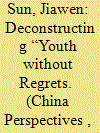| Srl | Item |
| 1 |
ID:
184578


|
|
|
|
|
| Summary/Abstract |
Among the many slogans and descriptive terms concerning educated youth, “youth without regrets” occupies a special place. On the one hand, it is one of the earliest and best-known slogans about educated youth, and even became a cultural symbol of China in the 1990s. On the other hand, its initial association with educated youth and popularity actually reflect not so much a coincidence as a complicity between the popular and state narratives. This article thus analyses in depth the whole range of issues related to the slogan "youth without regrets": the social context and political reasons for its emergence, the process that led to its popularity, its real meaning, and the common misunderstandings surrounding it, as well as the social, cultural, and political functions hidden behind its popularity.
|
|
|
|
|
|
|
|
|
|
|
|
|
|
|
|
| 2 |
ID:
114810


|
|
|
|
|
| Publication |
2012.
|
| Summary/Abstract |
The international community has many reasons to promote compromise between the parties to internal conflicts. Yet to do so effectively, the international community ought to treat principled rather than strategic compromise as its default position. To make this case, we begin by defining 'compromise' and by distinguishing principled from strategic compromise. We then defend the idea of principled compromise against the realist who thinks that that idea is implausible. We conclude by offering a number of practical reasons why principled compromise ought to be preferred. Our argument does not deny that strategic compromise will sometimes be the only option. But, unlike principled compromise, strategic compromise does not provide the parties with any particular reason to look beyond their own particular concerns or to give any ground beyond what is absolutely necessary.
|
|
|
|
|
|
|
|
|
|
|
|
|
|
|
|